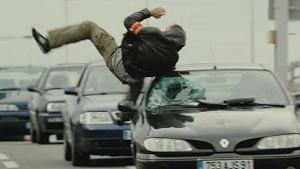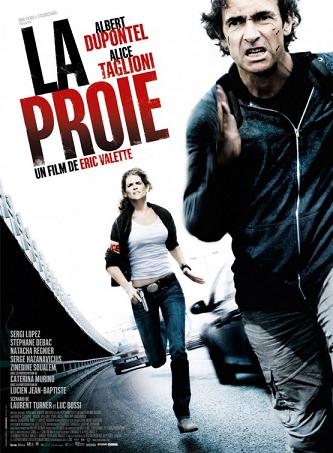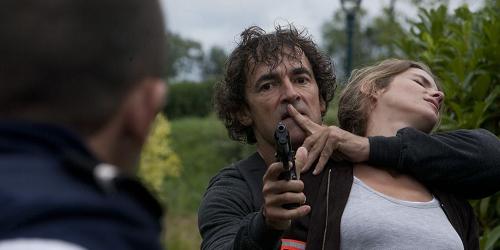 The Prey can be best described as puzzling. That’s not to say that the film is complex; it’s actually remarkably simple and woefully boilerplate, so much so that every so often as you watch it, you may feel as though you’ve watched it already. The real mystery here is how the film managed to avoid being released straight on home video despite being just at the level of DTV quality. If The Prey does one thing well, it’s meet the physical demands of its numerous action scenes handsomely- you won’t be completely bored even while you experience deja vu- but it doesn’t have an original or intelligent thought in its musclebound body.
The Prey can be best described as puzzling. That’s not to say that the film is complex; it’s actually remarkably simple and woefully boilerplate, so much so that every so often as you watch it, you may feel as though you’ve watched it already. The real mystery here is how the film managed to avoid being released straight on home video despite being just at the level of DTV quality. If The Prey does one thing well, it’s meet the physical demands of its numerous action scenes handsomely- you won’t be completely bored even while you experience deja vu- but it doesn’t have an original or intelligent thought in its musclebound body.
 Every single plot element here plays in the most expected way possible. Put differently, it’s a “natch” movie where each outcome feels like a foregone conclusion. Start with a man, Franck (Albert Dupontel), stuck in prison for a robbery he committed to support his wife and daughter (natch); expand on that with the introduction of Jean-Louis (Stephane Debac), Franck’s seemingly innocent cellmate who earns a get out of jail free card before revealing that he’s exactly the sadistic killer people accuse him of being (natch); continue with Claire (Alice Taglioni), a female supercop who nonetheless takes flak from her demanding superior (natch); end with the three of them on a collision course as Franck escapes to find Jean-Louis, who knows too much about Franck’s family for comfort, and Claire starts following Franck’s trail (natch).
Every single plot element here plays in the most expected way possible. Put differently, it’s a “natch” movie where each outcome feels like a foregone conclusion. Start with a man, Franck (Albert Dupontel), stuck in prison for a robbery he committed to support his wife and daughter (natch); expand on that with the introduction of Jean-Louis (Stephane Debac), Franck’s seemingly innocent cellmate who earns a get out of jail free card before revealing that he’s exactly the sadistic killer people accuse him of being (natch); continue with Claire (Alice Taglioni), a female supercop who nonetheless takes flak from her demanding superior (natch); end with the three of them on a collision course as Franck escapes to find Jean-Louis, who knows too much about Franck’s family for comfort, and Claire starts following Franck’s trail (natch).
Where do the thrilling mistaken identity hijinks end? Probably exactly where you guess they will after the film’s first act. Until the credits start rolling, enjoy an hour and forty minutes of pure, unadulterated dopiness and thematic dissonance. Is The Prey a film about a man hunting down a child molesting serial rapist, or is it a film about an honorable crook struggling to take care of his family? It’s almost more interesting to watch Franck navigate prison society and culture as he tries to keep his head down and deflect attention; for a time The Prey feels like a work of social justice stuck squarely in the can, where prison guards supervise and facilitate brutal inmate beatings for their own amusement.
That’s not to say that the film plays all that smartly even in these moments; director Eric Valette plays with a very boorish, very juvenile concept of the reality of jail systems. In his mind, the lives of those of confined behind bars are defined by daily stylized violence perpetuated by crooked penitentiary employees. It’s a gleefully sadistic vision, at least while it lasts, but at least The Prey is trying to say something in these moments even if it articulates that message with nary an ounce of finesse before abandoning it completely to play a cat-and-mouse game that refers to every televised cop TV trope in the book.

Not to mention far stronger contemporary French thrillers ranging from Point Blank to Tell No One, from which The Prey shamelessly borrows its central conceit. For as much as Valette yanks ideas and material from better sources, he can’t muster up the craft necessary to cobble something above this low-rent out of them; he has an eye for capturing chases but absolutely no sense for staging drama. He renders his whole film inert almost right out of the gate, piling ludicrous beat after ludicrous beat on top of one another until The Prey becomes impossible to take seriously for all of its rampant absurdities.
In another action film, we might accept that Franck can suffer nothing worse than a mild limp after falling several stories onto the roof of a van. That would be fare more along the lines of District B13, a picture built using the specific rules of its individual genre, which The Prey does not at all belong to. Franck does not practice parkour; he lacks the muscular firepower necessary to make a heroic leap onto a moving train feasible. Most of all, he’s the protagonist in a movie that grounds itself in the kind of glitzy faux-reality seen on Law & Order: SVU. The Prey occurs in the real world, but that doesn’t mean it bothers with any sort of realism.

So the big question here is how talented performers like Dupontel and Sergi Lopez wound up getting roped into this mess. Some may recognize Dupontel as the hapless Pierre of Gaspar Noe’s Irreversible; Lopez, on the other hand, may be more instantly identifiable as the brutal Captain Vidal of Guillermo Del Toro’s Pan’s Labyrinth. In their own ways they bring some life and gravitas to the proceedings, though Lopez is woefully underused as an obsessive former gendarme and the only man who knows Jean-Louis’ true criminal nature. He’s the film’s Ahab, and he’s a delight until he’s literally run off the road and never heard from again.
G-S-T Ruling:
Thankfully, Dupontel, whose hooked nose and arched brow aren’t at all suggestive of typical action hero traits, is up to the challenge of chewing his way through the rest of the film solo. But even the great turns from both men can’t disguise The Prey for what it is (much in the way that Jean-Louis can’t hide his sinister bent with a fanny pack). The Prey ties itself up so neatly as to be infuriating, with every climactic development telegraphed from several leagues away; viewing the film for the first time, you’ll be able to play each sequence like an orchestra if you pay even the slightest attention.


